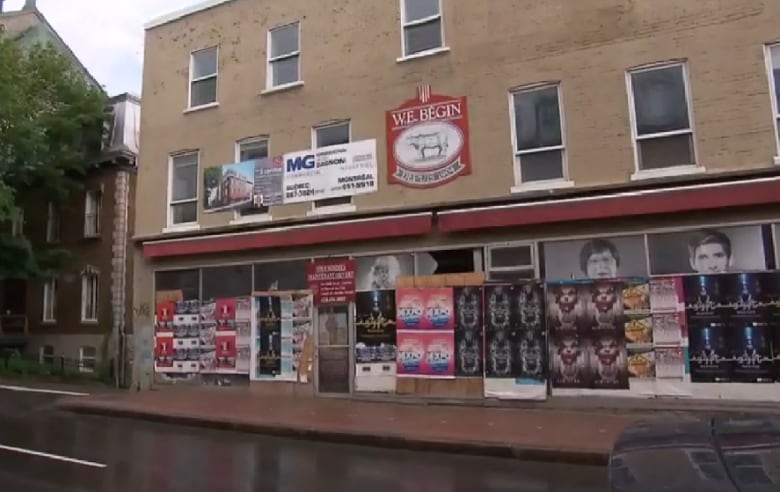Quebec City seeks power to expropriate abandoned buildings
City's inability to force repairs to crumbling mansion next to the Citadelle prompts protests from neighbours

Quebec City is seeking the power to expropriate dilapidated and abandoned buildings on its territory.
The call comes as people who live in the historic old city lose patience over the condition of 47 Ste-Geneviève Avenue, an abandoned mansion that was once home to the restaurant chez Bahuaud, just steps away the historic Citadelle.
Windows are boarded up. The lawn is overgrown with weeds. There is a splash of graffiti on one of the doors.
The head of the Vieux-Québec citizens' committee, Jean Rousseau, says it's a "scandal" that the historic building has been left to deteriorate for the past seven years.
Rousseau believes the property owner is simply waiting until the building becomes so decrepit, the city will be forced to allow its demolition, making way for new condominiums.
"Forty-seven Ste-Geneviève is symbolic of our municipal administration's laissez-faire attitude," Rousseau said.
However, the Quebec City councillor responsible for culture and heritage, Julie Lemieux, said the city can order the property owner to board up the building and to make emergency structural repairs, but it is powerless to force the property owner to renovate.
"It's an unacceptable situation," Lemieux said.

Awaiting 'special status'
It's not just the old mansion on Ste-Geneviève Avenue.
Maison Pollack, next to the Plains of Abraham and the clubs and restaurants of Grande Allée's, built in 1909, sits empty, covered in scaffolding.
A former butcher shop, W.E. Bégin, on St-Jean Street just outside the walls of the old city, is covered in concert posters and graffiti.

Lemieux said the city wants more power to intervene, "to force uninterested or inactive owners to take care of their residences, especially in the historic neighbourhood," she said.
Both Montreal and Quebec City are awaiting new legislation that will grant them special status, and with that, more powers over city planning, transportation and environmental issues.
Lemieux said officials for the two cities have been discussing seeking the power to expropriate buildings that have become eyesores.
"We are looking for ... the power to recuperate these buildings that are in a lamentable state and put them up for sale on the market, to sell them to a third party interested in renovating them," Lemieux said.
Modify existing law, municipal legal expert suggests
However, a lawyer who specializes in municipal law, François Marchand, said Quebec City already has powers it's not exercising.
City regulations already allow the municipality to force a property owner to take action if a building presents a health risk – for instance, if it's vermin-infested – or presents some other danger to the public.
Marchand said it wouldn't be difficult to modify that regulation, to force negligent property owners to undertake maintenance and repairs.
"The power already exists," in the provincial urban planning law, he said.
But Quebec City's mayor insists it will take special powers.
"We can do nothing," said Régis Labeaume. "If we could do something, we would have been doing it for decades."
with files from Radio-Canada